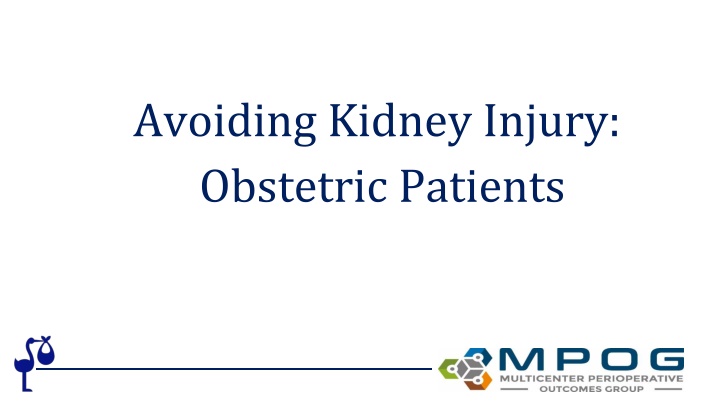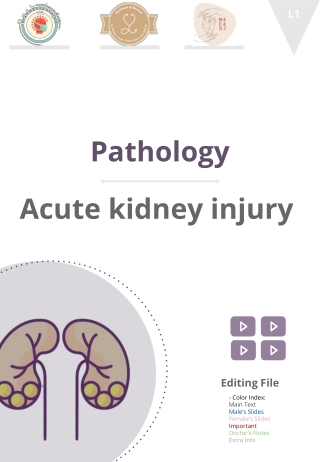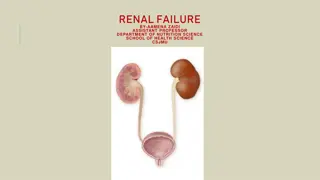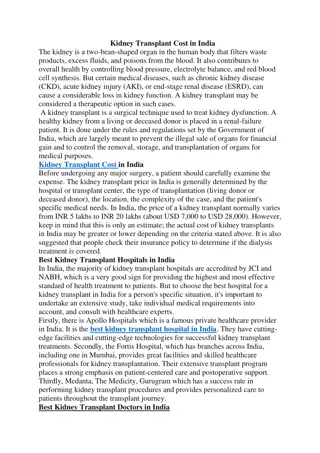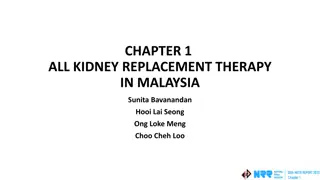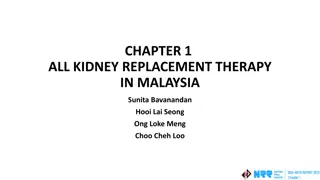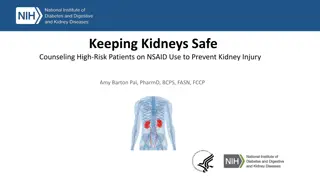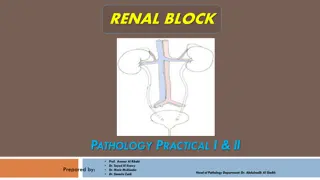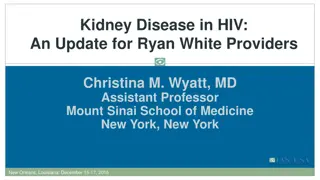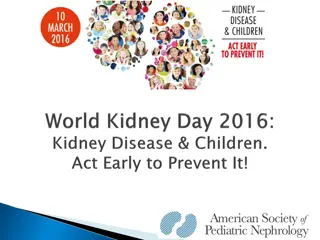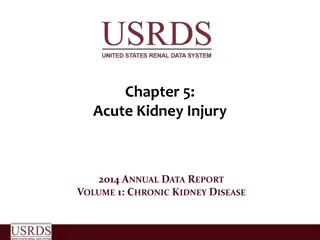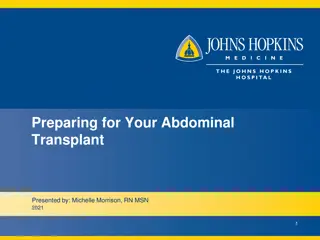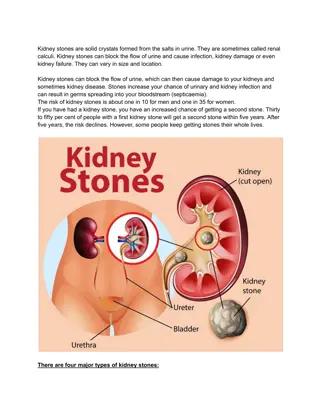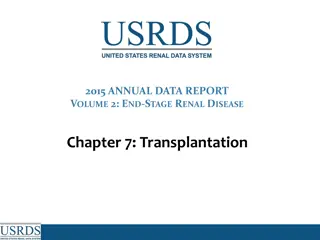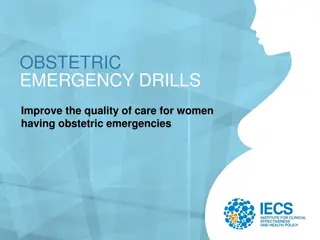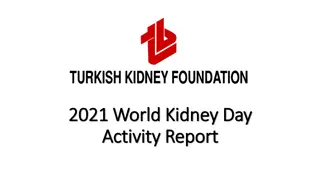Avoiding Kidney Injury in Obstetric Patients
Discussion on the impact of acute kidney injury and chronic kidney disease in pregnant women, including renal function changes during pregnancy and the implications of CKD on maternal and fetal outcomes. Recommendations for anesthesia in obstetric patients with renal issues are also covered.
Download Presentation

Please find below an Image/Link to download the presentation.
The content on the website is provided AS IS for your information and personal use only. It may not be sold, licensed, or shared on other websites without obtaining consent from the author.If you encounter any issues during the download, it is possible that the publisher has removed the file from their server.
You are allowed to download the files provided on this website for personal or commercial use, subject to the condition that they are used lawfully. All files are the property of their respective owners.
The content on the website is provided AS IS for your information and personal use only. It may not be sold, licensed, or shared on other websites without obtaining consent from the author.
E N D
Presentation Transcript
Avoiding Kidney Injury: Obstetric Patients
Objectives Discuss incidence and impact of acute kidney injury & chronic kidney disease in obstetric patients Review the pathophysiology related to pregnancy and risk for developing AKI Summarize neuraxial and general anesthesia recommendations supported by the literature for obstetric patients with AKI or CKD
For more information. For a more in-depth overview of kidney disease, including staging and definitions, reference: MPOG Avoiding Kidney Injury - Overview, Pathophysiology, Definitions For other specialty specific recommendations, reference the following sections of the toolkit: Avoiding Kidney Injury - Pediatrics Avoiding Kidney Injury - Cardiac Avoiding Kidney Injury - Recommendations for Adult Surgical Patients
Kidney Disease in Obstetric Patients Kidney disease is an independent risk factor for maternal and fetal morbidity and mortality1 Multiple renal physiologic changes in pregnancy AKI in pregnancy is rare, hard to define, and difficult to measure
Renal Function Changes in Pregnancy 2,3 Renal Blood Flow Plasma osmolality and plasma sodium levels Protein excretion (up to 300mg/24h) Scr Uric Acid Excretion GFR (30-50%)
Renal Function Changes in Pregnancy 3,4,5 Kidney size by 1 cm Intravascular volume Progesterone causes smooth muscle relaxation Kidney volume increases up to 30% and dilation of calyces, pelvis and ureters occurs Stasis, resulting in increased risk of urinary tract infection Gravid uterus causes partial ureteral obstruction
CKD in Obstetric Patients CKD is estimated to affect 3% of all pregnant women6 5x more likely to experience7: Gestational HTN Preeclampsia Eclampsia Maternal Mortality Maternal Outcomes 2x greater risk of adverse fetal outcomes7 Risk proportional to degree of maternal CKD8,9 Fetal Outcomes
CKD in Pregnancy Obstetric complications increase proportionally with the extent of the mother s preexisting renal disease and hypertension10 Women with CKD at increased risk for preeclampsia and preterm delivery11 There is a 4.7x greater risk of progression to ESRD for patients with CKD that develop preeclampsia12 Maternal Renal Function Associated Risks 11, 13, 14, 15, 16, 17 Mild elevated creatinine (1.2-1.4mg/dL) Small risk for decline in renal function Moderate renal insufficiency (1.4-2.5mg/dL) 20-30% increased risk of preeclampsia and preterm delivery Severe renal insufficiency (Cr >2.5mg/dL) 70% experience preterm delivery, 40% experience loss of renal function during pregnancy or postpartum leading to dialysis
Perioperative Management of Obstetric patients with CKD Periop Eval Include assessment of changes to renal function and related systems18 Consults Consult nephrology team to assist early in pregnancy19 Anesthetic Management Dependent on severity of CKD 18 Typically euvolemic patients with stable mild to moderate renal insufficiency and well controlled HTN do well with minimal special interventions 11 Dialysis dependent patients present greater anesthetic challenge 11 Nephrotoxic Drugs Avoid nephrotoxic drugs in patients with residual kidney function11
Neuraxial Anesthesia Considerations for Obstetric patients with CKD Determine fluid status before anesthesia11 If euvolemic, treat hypotension with a vasopressor instead of fluids to reduce risk of fluid overload Assess coagulation status At risk for abnormal bleeding11 May have residual heparin from HD catheter that precludes regional anesthesia 11 Documentation of pre-existing neuropathy prior to neuraxial anesthesia 18 Insufficient evidence to recommend spinal vs epidural18
Intraop Management of Obstetric patients with CKD Non invasive BP monitoring appropriate for early CKD with well controlled HTN 11 Pad and protect HD fistula, no blood pressures on that arm18 Check serum K before OR, succinylcholine will cause a 0.5-0.7 mEq/L increase 18 Magnesium sulfate prolongs NMB 11 Morphine and meperidine can cause accumulation of toxic metabolites in renal failure 11,20 Fentanyl, sufentanil, remifentanil are considered safe to use in renal failure 18,21 Neuraxial opioids are a good choice for postop pain relief if not contraindicated 18,22 NSAIDs may worsen renal function 11,23
AKI In Pregnancy Causes of AKI In developing countries, septic abortions are the most prevalent cause of pregnancy related AKI24,25 In developed countries, the most common causes are severe preeclampsia-eclampsia, acute pyelonephritis of pregnancy, and bilateral renal cortical necrosis26,27 The majority of women who experience AKI in pregnancy have comorbid conditions or pregnancies complicated by kidney disease, hypertension, diabetes, preeclampsia, HELLP syndrome, hemorrhage or infections28
Pregnancy Specific Causes of AKI 29,2 Early Causes (<20 weeks) Late Causes (>20 weeks) Hemorrhage (abortion, ectopic pregnancy) Sepsis/Septic Shock (abortion, retained products of conception, pyelonephritis, etc) Hypovolemia (d/t hyperemesis gravidarum) Hemorrhage (antepartum: placenta previa, placental abruption, placenta accreta) (postpartum: atony, trauma, uterine rupture) Sepsis (pyelonephritis, chorioamnionitis, puerperal sepsis) Pre-Renal Acute tubular necrosis (d/t septic abortion) Preeclampsia HELLP Syndrome (most common cause of AKI in pregnancy) Acute fatty liver disease of pregnancy Thrombotic thrombocytopenic purpura (TTP) Atypical hemolytic uremic syndrome (aHUS) Intrinsic n/a Uteropelvic obstruction (gravid uterus, masses, renal stone, normally seen with a pelvic pathology) Surgical (ureter damage, post surgical obstruction) Neoplasm Post-Renal
AKI in Pregnancy Non-pregnant AKI definitions (ie KDIGO) not appropriate during pregnancy No consensus definition of AKI in pregnancy, making it difficult to establish incidence rate2 Acute renal failure was found in 4.52 per 10,000 US births from 2008-200930 Non- pregnant adult First Trimester Second Trimester Third Trimester 31 Normal Ref Range Creatinine (mg/dL) .05-.09 0.4-0.7 0.4-0.8 0.4-0.9 SCr 1.1mg/dL or doubling SCr in the absence of other renal disease ACOG Renal Insufficiency Definition32 Definition used as part of diagnostic criteria for severe preeclampsia
AKI in Pregnancy Increased renal function may mask early AKI symptoms2 Lab values considered normal in non-pregnant women may indicate worsening renal function in pregnant patients29 Increasing proteinuria in pregnant patients with CKD may be normal in the progression of pregnancy and not indicative of worsening function Difficult to establish baseline GFR in pregnancy without 24h collection2 Oliguria in preeclampsia is part of disease pathology in response to intravascular depletion and may not indicate worsening renal fn29
Management of AKI in Pregnancy Management of AKI in pregnancy should focus on management of the cause of AKI and consider multiple causes2 Should also consider non-pregnancy related causes of AKI29 Renal biopsy rarely indicated, usually delayed until after delivery29 Should use multidisciplinary approach Renal therapy2: Low dose dopamine - Not recommended Furosemide - Not recommended Fenoldopam - Needs further research N-acytylcysteine - Needs further research Albumin - Needs further research
Clinical Assessment of Pregnant Women with Raised Creatinine 29
AKI in Pregnancy Management Consider transfer to specialty center if not responding to initial conservative measures29 Review medications and discontinue nephrotoxic drugs if possible29 Renally cleared medications may need adjustment A single loading dose of magnesium sulfate for preeclampsia considered safe even in renal failure Should optimize status before delivery18 If BUN >80 mg/dL or K >5.5mEq/L, dialysis should be performed before elective vaginal or c-section delivery Neuraxial anesthesia is preferred to general anesthesia18 Considerations for general anesthesia in the setting of AKI similar to that for CKD
Obstetric Kidney Disease Summary Kidney disease in pregnancy increases risk of adverse outcomes to both the mother and the fetus Perioperative management of obstetric patients with CKD should consider CKD staging and related physiologic changes Intraop management of CKD should consider individual need for CVP monitoring dependent on fluid status, adjustments of anesthetic medications as appropriate, and protection of HD fistula if present Multiple renal physiologic changes in pregnancy make AKI in pregnancy hard to define and difficult to measure. Lab values considered normal in non-pregnant women may be indicative of AKI in pregnancy Obstetric AKI management should be individualized to consider the cause of the AKI Considerations should be made to discontinue nephrotoxic drugs as appropriate and monitor bleeding risk related to neuraxial anesthesia
References 1. Fischer, Michael J., Susie D. Lehnerz, Jeff R. Hebert, and Chirag R. Parikh. 2004. Kidney Disease Is an Independent Risk Factor for Adverse Fetal and Maternal Outcomes in Pregnancy. American Journal of Kidney Diseases: The Official Journal of the National Kidney Foundation 43 (3): 415 23. 2. Van Hook, James W. 2014. Acute Kidney Injury during Pregnancy. Clinical Obstetrics and Gynecology 57 (4): 851 61. 3. Podymow, Tiina, Phyllis August, and Ayub Akbari. 2010. Management of Renal Disease in Pregnancy. Obstetrics and Gynecology Clinics of North America 37 (2): 195 210. 4. Christensen, T., J. G. Klebe, V. Bertelsen, and H. E. Hansen. 1989. Changes in Renal Volume during Normal Pregnancy. Acta Obstetricia et Gynecologica Scandinavica 68 (6): 541 43. 5. Kuczkowski, Krzysztof M., and Laurence S. Reisner. 2003. Anesthetic Management of the Parturient with Fever and Infection. Journal of Clinical Anesthesia 15 (6): 478 88. 6. Webster, Philip, Liz Lightstone, Dianne B. McKay, and Michelle A. Josephson. 2017. Pregnancy in Chronic Kidney Disease and Kidney Transplantation. Kidney International 91 (5): 1047 56. 7. Nevis, Immaculate F., Angela Reitsma, Arunmozhi Dominic, Sarah McDonald, Lehana Thabane, Elie A. Akl, Michelle Hladunewich, et al. 2011. Pregnancy Outcomes in Women with Chronic Kidney Disease: A Systematic Review. Clinical Journal of the American Society of Nephrology: CJASN 6 (11): 2587 98.
References 8. Alsuwaida, Abdulkareem, Dujanah Mousa, Ali Al-Harbi, Mohammed Alghonaim, Sumaya Ghareeb, and Mona N. Alrukhaimi. 2011. Impact of Early Chronic Kidney Disease on Maternal and Fetal Outcomes of Pregnancy. The Journal of Maternal-Fetal & Neonatal Medicine: The Official Journal of the European Association of Perinatal Medicine, the Federation of Asia and Oceania Perinatal Societies, the International Society of Perinatal Obstetricians 24 (12): 1432 36. 9. Ramin, Susan M., Alex C. Vidaeff, Edward R. Yeomans, and Larry C. Gilstrap 3rd. 2006. Chronic Renal Disease in Pregnancy. Obstetrics and Gynecology 108 (6): 1531 39. 10. Lindheimer, Marshall D., and Adrian I. Katz. 1994. 9 Gestation in Women with Kidney Disease: Prognosis and Management. Bailli re s Clinical Obstetrics and Gynaecology 8 (2): 387 404. 11. Chinnappa, V., S. Ankichetty, P. Angle, and S. H. Halpern. 2013. Chronic Kidney Disease in Pregnancy. International Journal of Obstetric Anesthesia 22 (3): 223 30. 12. Vikse, Bj rn Egil, Lorentz M. Irgens, Torbj rn Leivestad, Rolv Skjaerven, and Bjarne M. Iversen. 2008. Preeclampsia and the Risk of End-Stage Renal Disease. The New England Journal of Medicine 359 (8): 800 809. 13. Katz, A. I., J. M. Davison, J. P. Hayslett, E. Singson, and M. D. Lindheimer. 1980. Pregnancy in Women with Kidney Disease. Kidney International 18 (2): 192 206. 14. Abe, S., Y. Amagasaki, K. Konishi, E. Kato, H. Sakaguchi, and S. Iyori. 1985. The Influence of Antecedent Renal Disease on Pregnancy. American Journal of Obstetrics and Gynecology 153 (5): 508 14.
References 15. Jungers, P., P. Houillier, D. Forget, M. Labrunie, H. Skhiri, I. Giatras, and B. Descamps-Latscha. 1995. Influence of Pregnancy on the Course of Primary Chronic Glomerulonephritis. The Lancet 346 (8983): 1122 24. 16. Abe, S. 1991. Pregnancy in IgA Nephropathy. Kidney International 40: 1098 1102. 17. Chopra, Seema, Vanita Suri, Neelam Aggarwal, Meenakshi Rohilla, Anish Keepanasseril, and H. S. Kohli. 2009. Pregnancy in Chronic Renal Insufficiency: Single Centre Experience from North India. Archives of Gynecology and Obstetrics 279 (5): 691 95. 18. Katz, Daniel, and Yaakov Beilin. 2019. Renal Disease. In Chestnut s Obstetric Anesthesia: Principles and Practice 6th Edition, edited by David Chestnut, Cynthia Wong, Lawrence Tsen, D. Ngan Kee Warwick, Yaakov Beilin, Jill Mhyre, Brian T. Bateman, and Naveen Nathan, 1215 30. Elsevier. 19. Wiles, Kate, Lucy Chappell, Katherine Clark, Louise Elman, Matt Hall, Liz Lightstone, Germin Mohamed, et al. 2019. Clinical Practice Guideline on Pregnancy and Renal Disease. BMC Nephrology 20 (1): 401. 20. Craig, R. G., and J. M. Hunter. 2008. Recent Developments in the Perioperative Management of Adult Patients with Chronic Kidney Disease. British Journal of Anaesthesia 101 (3): 296 310. 21. Niscola, Pasquale, Laura Scaramucci, Gisella Vischini, Marco Giovannini, Michele Ferrannini, Pasquale Massa, Paola Tatangelo, Massimo Galletti, and Roberto Palumbo. 2010. The Use of Major Analgesics in Patients with Renal Dysfunction. Current Drug Targets 11 (6): 752 58.
References 22. Carvalho, Brendan, and Alexander J. Butwick. 2017. Postcesarean Delivery Analgesia. Best Practice & Research. Clinical Anaesthesiology 31 (1): 69 79. 23. Heleniak, Zbigniew, Magdalena Ciepli ska, Tomasz Szychli ski, Dymitr Rychter, Kalina Jagodzi ska, Alicja K os, Izabela Ku miuk, et al. 2017. Nonsteroidal Anti-Inflammatory Drug Use in Patients with Chronic Kidney Disease. Journal of Nephrology 30 (6): 781 86. 24. Prakash, Jai, Hemant Kumar, D. K. Sinha, P. G. Kedalaya, L. K. Pandey, P. K. Srivastava, R. Raja, and Usha. 2006. Acute Renal Failure in Pregnancy in a Developing Country: Twenty Years of Experience. Renal Failure 28 (4): 309 13. 25. Bentata, Yassamine, Brahim Housni, Ahmed Mimouni, Abderrahim Azzouzi, and Redouane Abouqal. 2012. Acute Kidney Injury Related to Pregnancy in Developing Countries: Etiology and Risk Factors in an Intensive Care Unit. Journal of Nephrology 25 (5): 764 75. 26. Stratta, P., L. Besso, C. Canavese, A. Grill, T. Todros, C. Benedetto, S. Hollo, and G. P. Segoloni. 1996. Is Pregnancy-Related Acute Renal Failure a Disappearing Clinical Entity? Renal Failure 18 (4): 575 84. 27. Machado, Susana, Nuno Figueiredo, Andreia Borges, Maria S o Jos Pais, Lu s Freitas, Paulo Moura, and M rio Campos. 2012. Acute Kidney Injury in Pregnancy: A Clinical Challenge. Journal of Nephrology 25 (1): 19 30. 28. Gurrieri, Carmelina, Vesna D. Garovic, Antonino Gullo, Katarina Bojani , Juraj Sprung, Bradly J. Narr, and Toby N. Weingarten. 2012. Kidney Injury during Pregnancy: Associated Comorbid Conditions and Outcomes. Archives of Gynecology and Obstetrics 286 (3): 567 73.
References 29. Hall, David R., and Frances Conti-Ramsden. 2019. Acute Kidney Injury in Pregnancy Including Renal Disease Diagnosed in Pregnancy. Best Practice & Research. Clinical Obstetrics & Gynaecology 57 (May): 47 59. 30. Callaghan, William M., Andreea A. Creanga, and Elena V. Kuklina. 2012. Severe Maternal Morbidity among Delivery and Postpartum Hospitalizations in the United States. Obstetrics and Gynecology 120 (5): 1029 36. 31. Abbassi-Ghanavati, Mina, Laura G. Greer, and F. Gary Cunningham. 2009. Pregnancy and Laboratory Studies: A Reference Table for Clinicians. Obstetrics and Gynecology 114 (6): 1326 31. 32. ACOG Practice Bulletin No. 202: Gestational Hypertension and Preeclampsia. 2019. Obstetrics and Gynecology 133 (1): e1 25.
